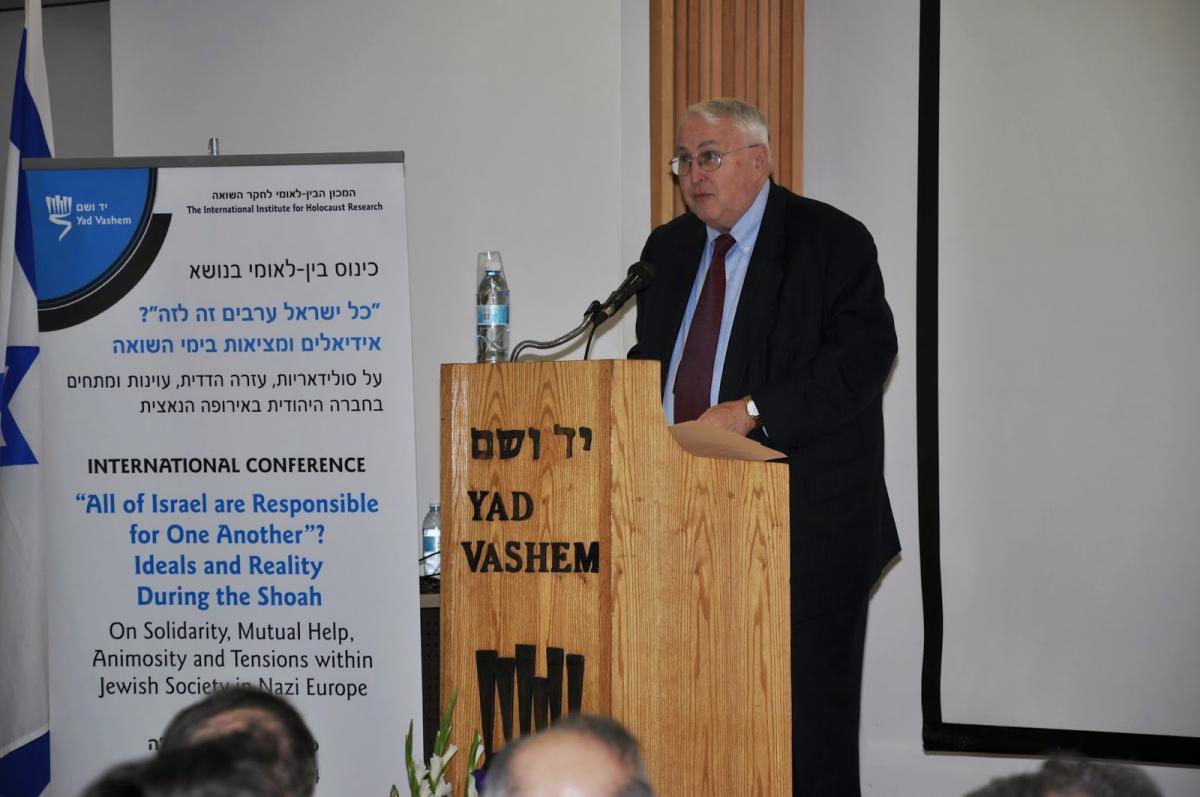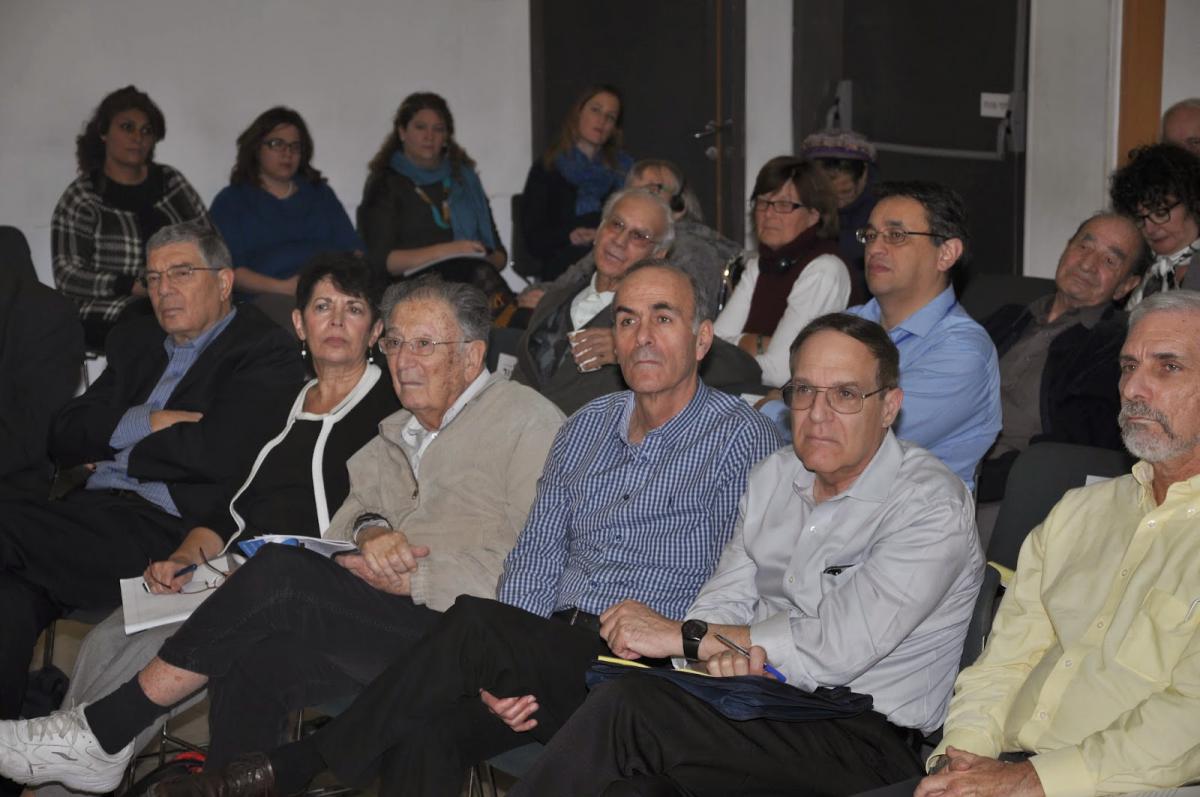



The Yad Vashem International Institute for Holocaust Research hosted an international conference from December 15, 2014 to Thursday, December 18, 2014. The conference entitled, "All of Israel are Responsible for One Another”? included researchers, historians and leading experts from all over the world, including Israel, Italy, Sweden, Austria, U.S.A., Germany and Canada. They presented lectures on various topics including solidarity, mutual help, animosity and tensions within Jewish society in Nazi Europe. The conference took place with the generous support of the Gertner Center for International Holocaust Conferences and the Gutwirth Family Fund.
“The conference addressed important and challenging issues, and raised central questions relating to coping mechanisms of the individual and the community in various situations during the Holocaust,” said Director of the International Institute for Holocaust Research, Dr. Iael Nidam-Orvieto. “It raised questions about the lack of, or existence of Jewish solidarity, explored conventional wisdom, and offered different types of reactions and coping vis-a-vis times of extreme crisis – from organized rescue through hostility and division.”
The opening session took place on Monday, December 15, 2014 with remarks from Professor Dan Michman, Head of the International Institute for Holocaust Research of Yad Vashem and Incumbent of the John Najmann Chair for Holocaust Studies. Also addressing the opening session included: Yad Vashem Director General Dorit Novak, Chairman of the Yad Vashem Council Rabbi Israel Meir Lau and Yad Vashem Chief Historian Dina Porat. Prof. David Engel, Maurice R. and Corinne P. Greenberg Professor of Holocaust Studies and Chair of Hebrew and Judaic Studies at New York University, presented the opening keynote address, entitled On Jewish Solidarity in Modern Times: What Might the Experience of the Holocaust Reveal about Modern Jewish History? Other topics addressed during the conference included families in Eastern European ghettos confronting starvation, deportation and murder; revenge and justice in the prewar concentration camps; and leadership and alternative leadership in the Kovno ghetto and Jewish communications during the Holocaust.
The concluding session took place on Thursday, December 18, 2014 with remarks from Prof. Dan Michman. "The conference addressed the aspect of expressions of Jewish solidarity and tensions within Jewish society in Nazi Europe through several perspectives: the dimensions of the ideal of mutual responsibility in the Jewish tradition, and its meaning for situations in the Holocaust; the question of the connection between unity and power in modern Jewish history and its repercussions for that period; and a broad variety of situations in which solidarity was tested - in camps and ghettos, by organizations and individuals, in thought and actions. The papers showed also that there were several levels of solidarity. Altogether, some recent claims that all solidarity collapsed were proved as being gross exaggerations."
In addition, a keynote addressed by Steven Katz, Boston University, U.S.A. on Kol Yisrael Arevim: Interpreting the Concept of Jewish Solidarity. Katz noted in his closing address, "As we listened intensively to the informative papers on a wide range of topics related to many geographical areas given at this conference, I would add the following based on what I've heard and learned… Despite the extraordinary context of the Shoah, unlike any previous context in Jewish or world history we have together been told of examples of Jewish solidarity…in the Polish ghettos and among the Jewish underground… the case of Jews in Eastern Europe who cared for each other…the responsibilities by doctors and nurses in the Warsaw ghetto…how they collaborated with each other in labor camps…most extraordinarily we heard about solidarity evident even at Auschwitz. I strongly agree with Professor Dalia Ofer that each context needs to be studied separately and in detail…when you finish that exploration, it seems to me that there still however leaves many questions. The really puzzling question, the truly deep and provocative question… based on the cumulative evidence…is not why there were so many failures in Jewish solidarity, so much selfishness …but rather the important issue given the conditions of intentional dehumanization, hunger, brutality, sadism, sickness, disease, rape, and the natural desire to stay alive…in this context the really profound issue is: How could there have been so many acts of moral courage, of mutual care, of ethical response? Perhaps millennia of Jewish solidarity and emphasizing, "All of Israel are responsible for one another" did make a difference. However limited and constrained, however unpredictable and uncertain, however bent by the crooked timber of mankind this difference was. In light of what I learned this week, I would argue that this is an authentic possibility that requires and deserves further reflection."










